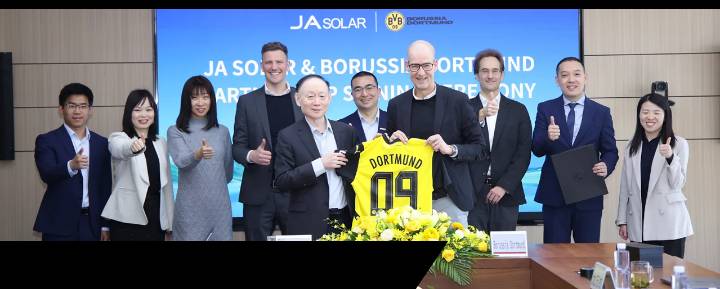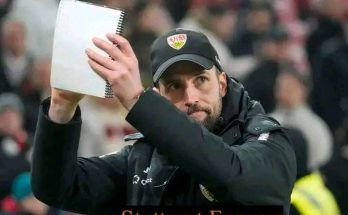Borussia Dortmund, one of Germany’s most beloved football clubs, has stunned both the sports and energy worlds with its latest game-changing announcement. The Black and Yellows have officially launched a revolutionary partnership with JA Solar to construct the world’s largest solar installation ever built on a stadium roof — right atop their legendary home, SIGNAL IDUNA PARK. The project, set to be a global symbol of innovation, sustainability, and forward-thinking leadership, marks a monumental step in merging sports culture with green energy technology. Over 11,000 cutting-edge, jet-black solar modules will soon crown the iconic Dortmund stadium, turning the roar of fans into the hum of renewable power.
For decades, Borussia Dortmund has stood as a symbol of passion, unity, and resilience — both on and off the pitch. Now, the club is cementing its reputation as an organization that looks beyond the present, embracing a future defined by environmental responsibility and technological excellence. With the club’s motto “Echte Liebe” (True Love) guiding every major decision, this move reflects Dortmund’s deep commitment not just to its fans, but to the planet itself.
According to reports from the club and its partners, the massive solar array will generate an estimated several million kilowatt-hours of clean electricity each year, enough to power not only SIGNAL IDUNA PARK but also contribute surplus energy back into Dortmund’s city grid. This green power boost will drastically cut the club’s carbon footprint, setting a new benchmark for sustainability in the global sports industry. For the first time, a football stadium known for its electrifying atmosphere will quite literally run on electricity harnessed from the sun.
The collaboration with JA Solar, one of the world’s leading producers of photovoltaic modules, highlights Dortmund’s determination to align itself with global leaders in renewable energy. JA Solar’s state-of-the-art technology, known for its high efficiency and durability, will ensure that every inch of the vast stadium roof contributes to producing sustainable power. Engineers are already describing the project as a “solar marvel,” designed to withstand the harshest weather conditions while delivering peak performance all year long.
The installation, which spans the equivalent of several football pitches, will cover nearly the entire surface of SIGNAL IDUNA PARK’s roof structure. Once operational, it will stand as the single largest solar system ever mounted on a sports arena — a feat that merges architectural brilliance with environmental stewardship. For Dortmund’s leadership, this isn’t just a business decision; it’s a statement of identity. In an era when climate change and energy transition dominate global conversations, BVB is sending a clear message: football can be more than entertainment — it can be a force for change.
Club CEO Hans-Joachim Watzke described the project as “a powerful symbol of how tradition and innovation can work hand in hand.” He emphasized that Borussia Dortmund’s responsibility extends beyond the pitch. “Our fans have always represented passion, strength, and togetherness. With this project, we add sustainability to those values. We want to inspire others — in football and beyond — to see that every organization can make a difference.”
The choice to partner with JA Solar was a strategic one. Founded in 2005, the Chinese energy giant has earned global acclaim for its technological breakthroughs and commitment to expanding renewable energy infrastructure worldwide. JA Solar’s collaboration with BVB marks its first major European sports partnership, and both sides have expressed excitement about what the project represents. The installation will not only generate green energy but will also become a living showcase of how innovation can seamlessly integrate into existing structures without compromising design or functionality.
For fans, the move feels like yet another reason to take pride in their club. Over the years, SIGNAL IDUNA PARK has become more than just a football stadium — it’s a cultural landmark, a beacon of identity for millions. With this transformation, it will now also serve as a beacon of sustainability, showing that even the most traditional institutions can embrace a modern, eco-conscious vision. The project is expected to reduce annual carbon emissions by thousands of tons, aligning perfectly with Germany’s national goal of reaching carbon neutrality by 2045.
Beyond the environmental benefits, the economic impact of the project is also significant. By generating its own renewable energy, Borussia Dortmund will drastically lower its long-term electricity costs, freeing up resources that can be reinvested into player development, youth programs, and fan experience. It’s a classic win-win scenario: financial prudence powered by environmental ethics.
The visual transformation of SIGNAL IDUNA PARK will also be breathtaking. The installation of over 11,000 high-tech panels will give the stadium’s roof a futuristic sheen — a black-glass finish that mirrors the club’s black and yellow identity. During daylight, the panels will glisten like armor; at night, the energy they collect will help illuminate the stadium, creating a poetic cycle of energy renewal. As one architect involved in the project put it, “It’s like capturing the sun by day to light up Dortmund’s nights.”
The project will be rolled out in phases, with construction expected to begin within months. Engineers will work carefully to ensure that the installation process doesn’t interfere with matches or fan attendance. Early projections indicate that the solar system could be fully operational within the next 18 to 24 months. When completed, the system will serve as a model for other clubs and organizations around the world. Already, whispers suggest that clubs across Europe — from England to Spain — are watching Dortmund closely, considering similar projects for their own venues.
Sustainability experts have praised Borussia Dortmund for its vision and leadership. Environmental organizations across Germany have applauded the club’s proactive stance, calling it a “milestone in sports sustainability.” The project goes beyond symbolism; it offers a practical, scalable blueprint for reducing the environmental footprint of large-scale entertainment venues. As climate challenges intensify, initiatives like these could redefine what it means for a sports team to be truly modern and responsible.
Even the city of Dortmund stands to benefit. Local officials have confirmed that the collaboration will help bolster the region’s renewable energy capacity, strengthen local infrastructure, and create new green jobs in installation and maintenance. “Borussia Dortmund has always been at the heart of our city,” said Mayor Thomas Westphal. “Now, it’s literally helping to power our future. This project embodies the spirit of progress that Dortmund stands for.”
The announcement has also sparked excitement across the football community. Fans have taken to social media to express admiration and pride, with hashtags like #BVBGreenPower and #SolarStadium trending worldwide. Some supporters even humorously suggested that Dortmund might now be “powered by goals and sunshine.” Others noted that the move perfectly captures the balance between tradition and innovation that defines modern football.
In recent years, sustainability has become an increasingly important topic in sports. From Formula 1 teams switching to carbon-neutral fuels to clubs investing in green training facilities, the movement is gaining momentum. Yet, Borussia Dortmund’s initiative stands out for its sheer scale and ambition. It’s not just an incremental step — it’s a leap forward. By choosing to transform its iconic home into a hub of renewable energy, BVB has positioned itself as a pioneer, setting a new gold standard for environmental responsibility in football.
The symbolic value of this project cannot be overstated. SIGNAL IDUNA PARK has always been a place where dreams, emotions, and energy collide. Now, that energy will take on a new meaning — one that connects human passion with the natural power of the sun. Every cheer, every chant, every moment of celebration inside the stadium will, in a way, be sustained by the light above.
As construction begins and the first solar panels are installed, Borussia Dortmund will not only be chasing trophies but also a greater legacy — a legacy of leadership in a world that urgently needs change. For a club that has always prided itself on being “more than football,” this project might be its most important victory yet.
In the coming years, when fans gather beneath the gleaming black panels of SIGNAL IDUNA PARK, they won’t just be witnessing the future of football — they’ll be standing under a symbol of hope, innovation, and responsibility. Borussia Dortmund has once again shown that greatness isn’t only measured by goals scored or matches won, but by the courage to redefine what’s possible.



